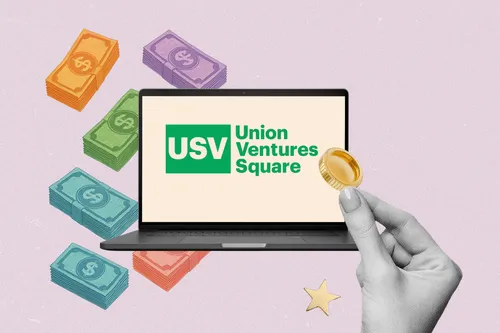How Women Are Stepping Into Financial Power — Even Without a Finance Background
Because Understanding Money Shouldn’t Be a Boys’ Club.
- Published
- Category
- Money Moves
Related Articles

From investment portfolios to term sheets, the world of money can feel, in a word, intimidating. To make matters worse, the financial world tends to push women out of the conversation. The good news is, you don’t need a degree in finance to get good with money. Plenty of women are learning financial literacy on the job, and it’s giving them the confidence they need to take their professional life to the next level, whether it’s budgeting, investing or fundraising. Here’s how to get started.
Harness the power of the group chat
When Jackie Lam, a freelance journalist, was just starting out in her writing career, she found the world of money to be incredibly intimidating. She was good at being frugal, but as a freelancer, success meant learning a whole new set of skills: setting rates, negotiating, budgeting, taxes, and investing, to name a few. To help get savvy on the tools of her trade, Lam leaned on an unlikely source: group chat.
Lam and a handful of her writer friends text each other specific money questions, where anyone who has knowledge can chime in and check each other. “So, for example, someone will say, hey, how do I start a budget? And figuring that out for them kind of helps me figure it out, too.” Research backs this up — a 2019 study found that offering advice to others can reinforce our own understanding of something. It’s not just about the group chat, of course, but the power of group dynamics and social support. Sharing your money anxieties with other women can help you search for answers together and feel less anxious overall.
Flip your script
It’s been said that money is more about mindset than it is about math. And for many women, money can be a huge anxiety trigger. “When I first started my business, I had a scarcity mindset,” said Catherine Collins, co-founder of Five Year You, a coaching company for professional women. “My business relies on clients, and I believed that I needed to do anything to build my client list, which included accepting less pay than I deserved.” She went above and beyond for clients at the expense of her own mental health and personal time — something many women can undoubtedly relate to.
A big change many women cite when they start feeling more professionally empowered is an “abundance mindset.” It might sound woo-woo, but studies suggest that financial confidence plays a key role in financial literacy. The more agency you feel over your financial situation, the more confident you feel, and the more confident you feel, the more likely you are to make sound financial choices. “If someone cannot afford my fees, I don't lower them now,” Collins said. “I know my client list will fluctuate and that slimmer periods don't mean something negative about me or what I offer. I know the steps to take to attract new clients, the amount I need in my business account to accommodate income variation, and how to weather fluctuations.”
Start small
Lam struggled with money early in her career, but over time, she picked up the financial knowledge she needed to run her freelance business: how to budget on a variable income, how to ask for higher rates, and how to get started with investing, since she didn’t have a company-sponsored 401(k) to rely on.
“Money is not as complicated as it seems,” Lam said. “It really isn’t. A lot of people think you have to have a degree in finances, but it's actually more like physical fitness or physical health, where there's actually just some really basic rules.”
Lam said that one topic continues to be intimidating for her, however: investing. Without a company sponsored 401(k) to rely on, freelancers, founders, and solopreneurs often have to figure out the ins and outs of investing — from picking funds to balancing a portfolio — all on their own. “It can feel very dangerous,” Lam said. “It's volatile. It's based on market conditions, economic conditions. There’s just so much to learn and I had this idea of some gray-haired, Wall Street day trader. I felt really distant from that.”
She got through the overwhelm by starting small — not only with her money but with her financial literacy. “So I started with maybe $100 a month with something like Acorns,” she said. “But it was super intimidating because I just didn't know how it worked. It felt like gambling. It's not something my family even really talked about.”
To push through the intimidation, Lam recommends beginning with just a single question (like, “what’s an exchange-traded fund?) and then spending just fifteen minutes a day researching the answer. Little by little, your financial literacy will improve.
Find your vision
When dealing with your finances, it’s easy to get bogged down with numbers and spreadsheets. “I always suggest people start with a vision,” said Lam, who has now become an AFC-accredited financial educator. “So, what is your vision for what you want in your life? This could be anything: career, personal, romantic, recreational, family, anything. What are your values? And how does money play into this? Start with the visions, start with the hopes, start with the dreams.”
Getting grounded in your purpose can be incredibly motivating when you’re feeling overwhelmed with budgeting or looking at term sheets. Plus, there are practical reasons for doing so. It can be helpful with things like fundraising, for example, because you’re not just asking people to invest in a product, you’re asking them to invest in your vision — but you have to define what that vision is in the first place.
Financial power and financial knowledge go hand in hand. The more you know, the more empowered you feel. And you don’t need to be a gray-haired Wall Street type to get there. “I wish more women knew that having financial clarity and truly understanding finances can bring incredible peace of mind,” said Collins, whose own financial journey inspired her book, Mom's Got Money. “Financial clarity, knowing where you stand, and what you need to do, is one of the best things you can do for your mental health.”




